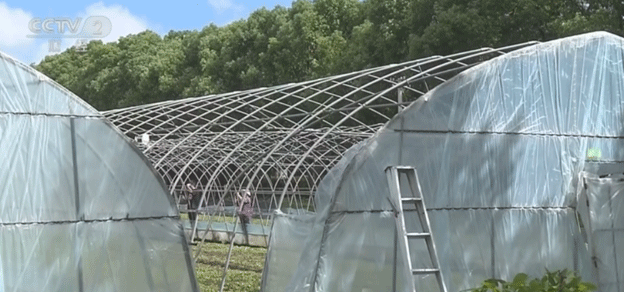The agricultural landscape in Shanghai has faced significant challenges due to Typhoon Bavi, which brought strong winds and heavy rainfall, adversely affecting local vegetable production. However, in the wake of this natural disaster, the city is committed to supporting farmers and restoring the agricultural supply chain to ensure food security.
Impact of Typhoon Bavi
The storm wreaked havoc on several agricultural bases in Shanghai, particularly in the Lingxia Town of Jinshan District. Many greenhouses were severely damaged, with some structures even losing their shape due to the force of the wind. As a result, farmers have experienced considerable disruptions in their production schedules, leading to concerns about vegetable supply continuity in the coming weeks.
Immediate Recovery Efforts
To address these challenges, local agricultural cooperatives and government agencies have mobilized resources to aid farmers in the recovery process. On September 17, agricultural technicians were dispatched to various farming sites to provide hands-on assistance. Their guidance has focused on:
- Drainage and Repair: Efforts to alleviate water accumulation in fields have been prioritized to prevent crop loss. Teams worked quickly to clear excess water from the affected areas, ensuring the fields are ready for planting and sowing once again.
- Crop Harvesting: In severely waterlogged areas, emergency harvesting of vegetables has been initiated to salvage what is left. Workers have been busy collecting produce that is at risk of rotting due to the extended exposure to moisture.
- Technical Support and Training: Agricultural specialists are offering practical advice to farmers on recovery techniques and the re-establishment of production. This includes recommendations on soil management, pest control, and replanting strategies, which are crucial for restoring productivity.
Looking Ahead: Ensuring Vegetable Supply
As recovery efforts progress, Shanghai aims to stabilize its vegetable supply and support its farmers in rebuilding their operations. According to recent reports from local agricultural authorities, the focus is not only on immediate recovery but also on implementing sustainable practices to better prepare for future weather-related disruptions. This proactive approach may involve:
- Enhanced Infrastructure: Investing in more resilient greenhouse designs and drainage systems to withstand extreme weather events.
- Diversified Crop Planning: Encouraging farmers to diversify their crops can help mitigate risks associated with climate change and fluctuating market demands.
- Community Support Programs: Establishing community initiatives that provide farmers with resources and shared knowledge can bolster collective resilience against natural disasters.
The efforts underway in Shanghai to recover from Typhoon Bavi illustrate the importance of community resilience in agriculture. By collaborating with agricultural experts and local farmers, the city is not only working to restore its vegetable supply but also laying the groundwork for a more robust agricultural future. These initiatives highlight the critical need for adaptability and innovation in farming practices, especially in the face of increasingly unpredictable weather patterns.































